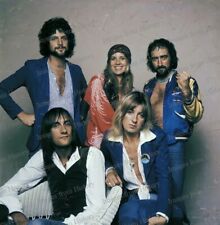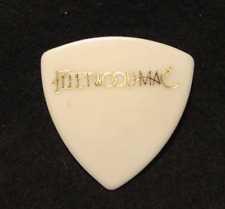|
Joe Queenan
Friday March 14, 2008
guardian.co.uk
There are many famous bands that start out good and end up bad. But there are very few bands that start out as one thing and end up as something completely different. The Bee Gees are an obvious example, and perhaps the Moody Blues. But the best example of all is Fleetwood Mac, who began life as a raw, breathtaking blues band and ended up as Fleetwood Mac.
When people talk about how English musicians took American blues, gave it a bit of a jolt, and then shipped it back to America, they are not just talking about the Rolling Stones, the Animals, the Spencer Davis Group and Led Zeppelin. They are talking about Fleetwood Mac, the best blues band Britain ever produced. There are no better blues recordings by white people than Shake Your Moneymaker and My Heart Beat Like a Hammer. The slide guitar on Dr Brown may be the single most joyous sound to ever come out of the British Isles. Too bad nobody knows about it.
In the band's four decades of existence, it has had more personnel changes than the Italian government, and the results have been equally mixed. It was founded in 1967 by guitarist Peter Green, who replaced Eric Clapton in John Mayall's Bluesbreakers. Mayall, who served the same role in rock music that Miles Davis served in jazz, ran his ensemble less as a going concern than as an intern programme for young British musicians who would go on to far greater success elsewhere. (Other famous alumni include Jimmy Page, Jack Bruce and Mick Taylor.)
Green's sidekicks in the original lineup were Jeremy Spencer, a brilliant slide guitarist who played his instrument as if it were a chain saw, bassist Bob Brunning, who left almost immediately, and drummer Mick Fleetwood, the only member to have been with the group from the very beginning. But bassist John McVie soon replaced Brunning, who later became the band's unofficial historian. (He has written three books about them, which may be two more than anyone really needs. What he really needs to write is Me, Pete Best and Syd Barrett: Out of the Band, Out of the Money.) "Fleetwood Mac", which sounds like a made-in-Detroit automobile circa 1959, was then concocted from the names of the new rhythm section, though it was adopted before McVie even joined. "Fleetwood Brun" was apparently never a serious option.
Fleetwood Mac immediately made an impression on both sides of the Atlantic, at least with the critics. The pixie-ish Spencer proved particularly endearing. Lurking behind a guitar at least twice his size, he would belt out the same explosive slide-guitar chord progressions in songs that were almost impossible to tell apart. (Dr Brown, Coming Home and My Heart Beat Like a Hammer are the same song, no matter who claims the songwriting credits.) There was something refreshing about this approach: if they liked it the first time, why not the 114th? (The Ramones may have been influenced by Spencer.)
Yet the group's best-known numbers were not typical of their searing, generally jubilant, tomcat repertoire. Black-Magic Woman, which later provided a much bigger hit for Santana, is a subdued, three-chord sketch that contains little of the band's raucous DNA. The same can be said of Albatross, an engaging 50s-ish instrumental I have heard performed in spiffy lounges from upper Regency Street to King Of Prussia, Pennsylvania. Fleetwood Mac's tragically brief incarnation as a blues band ended in 1970 when Green took one too many tabs of acid and entered an altered state from which he never fully re-emerged. For many, Green's departure marked the end of the golden age of British blues. A few years ago, he briefly returned from retirement to play a few gigs as the opening act for his one-time mentor Mayall, but the results were not pretty.
The band went through several incarnations in the next few years. Spencer blew town in 1971 to join a religious group called the Children of God. He's still in it. I once heard a rumour that before the Rolling Stones picked Ronnie Wood, a splendid slide guitarist, to replace Mick Taylor, a genius, they auditioned Jeremy Spencer but ended up rejecting him because he was too short to be a Stone. Fleetwood Mac soldiered on, adding new personnel as needed, the band's fortunes ebbing and flowing. Then, in 1975, McVie, his wife Christine (who had played keyboards on the group's previous records) and Fleetwood joined forces with the Americans Lindsay Buckingham and Stevie Nicks. Fleetwood Mac, which was also the title of the original unit's first LP, was a huge hit, but the follow-up was huge and then some.
Released in 1977, Rumours became one of the biggest-selling records of all time. It included well-crafted rock songs by Buckingham, catchy pop songs by Christine McVie and mysterious, witchy songs by Nicks, who brought shawls, scarves and capes to a new prominence in rock music. As was only fitting for a band whose members could never get along, the album's best song was Buckingham's crackling You Can Go Your Own Way, which was supposedly an ultimatum to his girlfriend Nicks to clear out and take her witchy shawls with her.
But Rumours also included Christine McVie's zippy Don't Stop. The song was a mammoth hit when first released, then achieved yet another level of fame 15 years later when Bill Clinton adopted it as the official theme of his presidential campaign. His opponent, George Bush Sr, stuck with that trusty old chestnut Now I Wanna Be Your Dog. (Sorry. Only kidding.) It has been theorized that the song expresses McVie's feelings about her breakup with John, though another theory is that no Fleetwood Mac record would ever be complete without at least two songs describing how much fun it was to stop living with a person you couldn't stomach even though they were still in your band. Throughout this era, Fleetwood himself kept a low profile, never committing his marital reflections to vinyl. Still, not to be a spoilsport, he too broke up with his wife.
Clinton's selection of the earnest if somewhat sappy song as his campaign theme is oddly appropriate. Like Fleetwood Mac, the Clintons started out as young people with fresh new ideas before settling into cozy, middle-aged predictability. Like Fleetwood Mac, the Clintons were plagued by marital discord. Like Fleetwood Mac, the Clintons started out as outsiders who fought their way into the inner circle. Like Fleetwood Mac, the Clintons were a brilliantly packaged product that the public responded to with enthusiasm. Like Fleetwood Mac, the Clintons started out modestly and ended up making money hand over fist. Like Fleetwood Mac, the Clintons had an amazing ability to survive adversity and regroup after setbacks that would have crushed less hardy souls.
There is something undeniably heroic about the ability of these two very different sets of people to prosper and endure when everyone else seems to be falling by the wayside. But musically speaking, I still wish Peter Green hadn't popped that acid.
|









